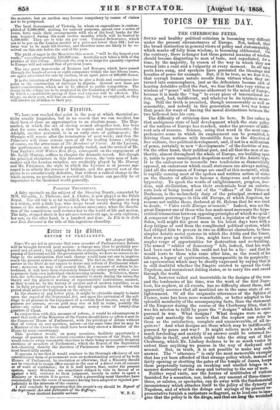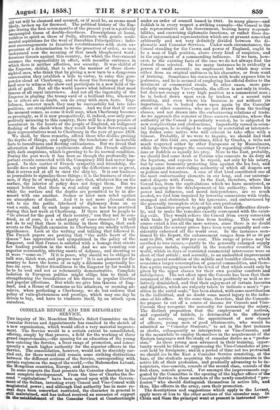TOPICS OF THE DAY.
THE CHERBOURG FETES.
Boum) and healthy political criticism is becoming very difficult under the present circumstances of Europe. Not indeed, that the broad distinction in general views of policy and statesmanship, which marks off folly from wisdom, is becoming obliterated. Oa the contrary, there is danger lest those general maxims of wisdom should become disgusting to men of taste, and repudiated, for a time, by the majority, by reason of the way in which they ara turned into a cant and a vulgarity at every moment. In all at poets have sung, and speakers have perorated the blessings and beauties of peace for example. But, if it be true, as we fear it is, that corrupt human nature recoils from virtues when they are turned into commonplaces, just as the Athenians became sick of hearing Aristides called the Just, we fear that this very virtue or wisdom of " peace " will become abhorrent to the mind of Europe, because it is made the " tag " to every piece of international ae- tion, good, bad, indifferent, and whatever be its intrinsic mean- ing. Still the truth is preached, though unseasonably as well as seasonably, and nobody in this generation can love war better than peace for want of having the moral distinctions between the two bellowed into his ears.
The difficulty of criticism does not lie here. It lies rather in that ambiguous state of half development which the state policy of the nations of Europe has reached, under the pressure of diffe- rent sets of reasons. Science, using that word in the most com- prehensive sense in which its employment can be permitted, is driving those nations with irresistible force in the direction of free culture free political development, and, if not to a millennium of peace, certainly to new " developments " of the doctrine of war. On the other hand, their political past, and. all that the men of au- thority, almost throughout the whole of Europe, are building upon it, tends to pure unmitigated despotism nearly of the Asiatic type. It is the endeavour to reconcile two tendencies so diametrically opposed, an endeavour which small statesmen are always making, (and all the statesmen of Europe are small at this moment), which is rapidly causing most of the spoken and written action of states on the theatre of affairs to become a dangerous and systematic hypocrisy,. To speak the words of enlightenment, progress, free- dom, and civilization, when their credentials bear an unfortu- nate look of being issued -out of the " offices " of the Prince of Darkness is the melancholy duty of the principal crowned and diplomatic personages in this old Europe, of which Napoleon, for reasons not unlike these, declared at St. Helena that he was tired to death. " Votre vielle Europe neetinuie." Indeed, was not the great Emperor one of those who has made most necessary the hypo- critical transaction between opposing principles of which we speak ? A conqueror of the type of Timourt and a legislator of the type of Solon, well might the great man in his latest days turn with a deep fatigue ot soul from the complicated political system, which had obliged him to govern in two so different characters to those simpler Asiatic social systems in which the Attila and the Timurr that were pent up within him, might have had freer scope and ampler verge of opportunities for destruction and re-building. The armed "soldier of democracy" felt, indeed, that his work had been east where his life could not but be a lie : and that he would leave to those who came after him, as the result of his labours, a legacy of equivocation, incomparable in its perplexity:. an equivocation which may be shortly expressed by saying that it is still doubtful whether the Empire existed to spread the Code Napoleon, and reconstruct falling states, or to carry fire and sword through the world.
But, however veiled and inscrutable in the designs of the man and the tendencies of his time, was the work of the first Napo- leon, his nephew, at all events, has no difficulty about them, and apparently assumes that all mankind are in the same state of en- lightenment. Of all the enigmatic utterances of the Sphinx of France, none has been more remarkable, or better adapted to the splendid mendacity of the accompanying facts, than the statement of the Emperor during the course of the Cherbourg fetes, that it was his mission to fulfil by peace the " designs " Ishii* his uncle pursued in war. What designs ? What designs were so spe- cially and markedly the uncle's that the nephew can refer to them as the satisfaction, complete and unanswerable, of all in- quirers? And. what designs are those which may be indifferently pursued by peace and war ? It might relieve men's minds of much foreboding and anxiety if an answer could be returned in- telligible in itself, and which could take the sting out of that Cherbourg, which Mr. Lindsay declares to be so much vaster its extent than anything we possess in the way of dockyard an arsenal. But, in truth, it is not possible to make any such answer. The " utterance " is only the most memorable example that has yet been afforded of that strange policy which, instead of fairly opening or shutting the gates of the temple of Janus, keeps them perpetually turning on creaking and unoiled hinges n ti manner destructive of the sleep and torturing to the ear of men. i
Neither royal visits, nor the hnzzas of multitudes of visitors famished for a sensation nor, indeed, any amount of three-times: three, or salutes or spectacles, can do away with the fundamental inconsistency which attaches itself to the policy of the dynasty of Napoleon, and of which the doings and sayings of its present re- presentative furnish a caricature so flagrant, as to lead one to ima- gine that the policy is in the dregs, and that ere long the wretched old vat will be cleansed and scoured, or if need be, as seems most likely, broken uk for firewood. The political history of the Em- pire during the lust seven months of the present year is a perfectly iutexampled tissue of double-faeedness. Proscriptions at home, ruthless in spirit as those of Sulla, alternate with gentle senti- mental aspirations for the weal of Danubian Principalities ; inde- cent encouragements to fanatical revolutionaries with stern ex- pressions of a determination to be the preserver of order, as men understand now the meaning of that much blasphemed word ; ferocious threats against this country, for which the Government assumes the responsibility in effect, with maudlin embraces in which there is neither affection, nor security. It was skilful of the Emperor, skilful, that is after the manner of those short- sighted ones, who think that by giving a new turn to a dangerous conversation they establish a title to virtue, to raise this gun- powder cloud at Cherbourg, and to decoy the Sovereign of Eng- land over to witness the show and participate in a new field of the cloth of gold. But all the world knows what followed that most famous of all royal interviews. And not all the ingenuity of the Emperor in playing the trump card of a brilliant fête, whenever he or others are in doubt, can do away with stern facts. Eng- lishmen, however much they may be successfully led into false positions, are straightforward persons. And we fear that if ever the moment comes, as come it well may, when Cherbourg becomes as pressingly, as it is now prospectively, if, indeed, now only pros- pectively menacing to this country, there will be a deep passion of resentment in the hearts of the people of England, an indignant flushing of the cheek when they recall how their Sovereign and their representatives went to Cherbourg in the year of grace 1858. We shall, by these remarks offend those who dislike probing the depths of things, and applying the touchstone of inexorable facts to tumultuous and fleeting enthusiasms. But we dread that alternation of factitious excitements about the French alliance with dark suspicions, which is growing to be its normal condition. During the past week it has been as though the profoundly- im- portant events connected with the Conspiracy Bill had never hap- pened. In this matter of French sympathy and friendship, the needle does not point due north, nay the deflections are so great, that it serves not at all to steer the ship by. It is our business as journalists to signalize these things ; it is the business of states- men, if they be of weight, to take care that, whatever lies on the surface, the interior of policy does not forget them. But we cannot believe that there is real safety and peace for states while the surface and the depths are permitted to be in dis- sword with one another. Sooner or later men rebel against an atmosphere of deceit. And it is not more pleasant than safe to see the polite falsehood of diplomacy done on so vast a scale, and by such large numbers, as has been practised during this last week at Cherbourg. If there must be people to "lie abroad for the good of their country," can they not be con- fined, as of yore, to a select party of ames damnees? It will not do to say that there is nothing in these things' that such events as the English excursion to Cherbourg are wholly without significance. Look at the writing and talking that followed it. The French papers are proving that "the noble heart of the Queen" has appreciated and sympathized in the policy of the Emperor, and that France is satisfied with a homage that attests her leading position in the world. And we are vaunting our superior seamanship, uttering snorts of defiance, and shouting as it were "come on!' If it is peace, why should we be obliged to talk war, think war, and prepare war ? It is not pleasant for the country to have the horns of so ugly a dilemma perpetually be- fore its eyes. Better friendliness to the Emperor by far would it be to be cool and not so vehemently demonstrative. Complete isolation in European politics might oblige him to think of strengthening the foundations of his throne in popular liberties and popular affections. But while we give him Queens of Eng- land, and a House of Commons as his admirers, or seeming ad- mirers, when perfecting a Cherbourg, we do but endorse that policy of vain-gloriousness and prestige which may one day be driven to bay, and have to vindicate itself, by an attack upon ourselves.



























 Previous page
Previous page